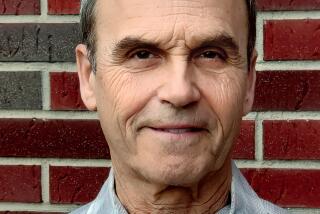In Another World, the Past Collides With the Present : THE SILVER CLOUD CAFE, by Alfredo Vea Jr. (Dutton; $23.95, 352 pages)
If I were a murder suspect and had my choice of literary lawyers to represent me, Alfredo Vea Jr. would be the one.
He might not be any more likely to get me acquitted than Scott Turow or John Grisham would, but Vea would listen to the mortal music that sounded behind the legalities of my story, whether I were guilty or innocent. He was a migrant farm worker before he passed the bar. He has passion, imagination and, simply, a more interesting mind than those other guys.
And what stories Vea would tell me during those late-night conferences as the cellblock lights sifted through the bars! Stories like his first novel, “La Maravilla,” and this one, in which the neon angels atop a Mexican cantina in San Francisco’s Mission District summon the lovelorn, the guilt-ridden and the dispossessed from wherever “brown men” bend over furrows under a hot sun, “sweating their own life essence.”
It almost would be worth getting busted.
In “The Silver Cloud Cafe,” the stand-in for Vea is defense attorney Zeferino del Campo, who also grew up in the Central Valley among Mexican braceros and Filipino manong. His sidekick and investigator is a Jewish mystic who drives a food-encrusted heap called the Kosher Cruiser.
Del Campo thinks his task is to defend Teodoro Cabiri (Ted for Short), a midget Filipino farm worker and nightclub performer who once imitated the crucified Christ in a village passion play in competition with Bambino Reyes, the man he is accused of killing. But, in fact, del Campo is called upon to confront his own past.
As a boy, he witnessed murder--the knifing of a vicious landowner in the asparagus fields out-side Stockton in 1959. The killers, his “uncles,” left him in another farm-labor camp and prayed that he would forget the violence. He did. Now, however, scenes and people tumble back into his life, colliding at the cantina in a burst of metaphysical fireworks.
Besides Ted for Short, they include Humberto, a mad ex-priest who should have died before a firing squad in Mexico’s Christero War of the 1920s; Miguel Govea, who was one of the teenage soldiers who shot Humberto; Anatoly, a Bulgarian Gypsy who drives a taxi without an engine; Faustino, an outcast even among outcasts because he is gay; Radiant Ruby, a stripper who runs from her one true love; King Pete Claver, a black ex-boxer who pushes a tamale cart; Beatrice, a 300-pound Samoan transsexual; even Cesar Chavez and the ghost of a famous Greek poet, C.P. Cavafy.
And angels. Plastic angels that hang from the ceilings of the Quonset huts and retirement hotels where the farm workers live out their lives--lonely and gentle men, as Vea describes them, victims of systematic exploitation, racist mobs and rigged justice. Real angels, who whisper in the cantina’s neon sign over the buzz of electricity and try to hide the world’s pain from a “surly God.”
This is clearly an imperfect novel. Some of the magical realism verges on mumbo-jumbo. Adjectives clot the prose. Lines of narrative peter out. Not every character earns his or her keep. Sometimes the action lags while Vea preaches about how “Americans run from custom and culture and each other” and how only “fools . . . believe that three centuries of lies have been . . . cured by three decades of affirmative action.”
But let me defend the defense attorney, for a change.
Your Honor, ladies and gentlemen of the jury, these are literary misdemeanors at most. The felony is to murder life in the interests of formula, and Vea isn’t guilty of that. The “other worlds” his characters talk about in mystical terms reflect what he knows in his gut--that, to the people driving by on the freeway, the people stooping in the fields really do live in another world. He spins an engaging yarn that makes us enter that world, tunes our ears to its joyful, mournful music.
More to Read
Sign up for our Book Club newsletter
Get the latest news, events and more from the Los Angeles Times Book Club, and help us get L.A. reading and talking.
You may occasionally receive promotional content from the Los Angeles Times.






